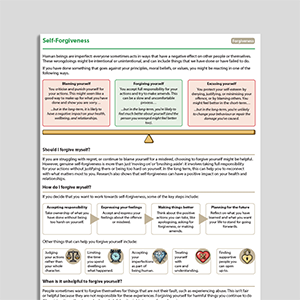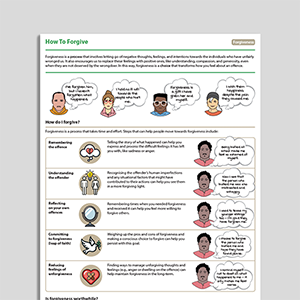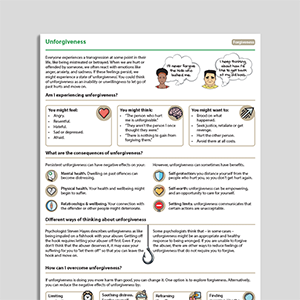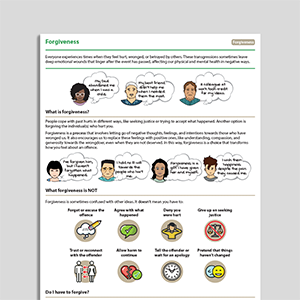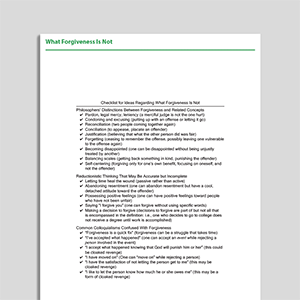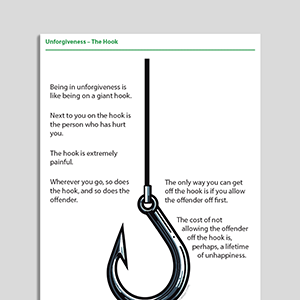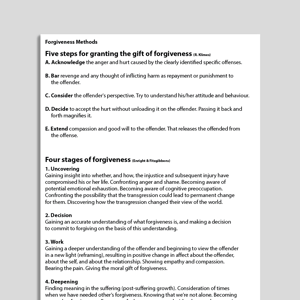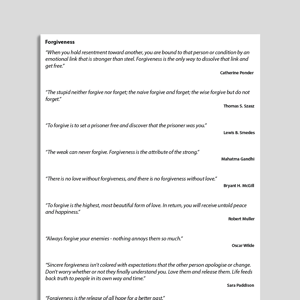Forgiveness
Forgiveness is an important treatment for resolving feelings of anger, hurt, and betrayal. Forgiveness therapy is an evidence-based treatment for anger (Enright & Fitzgibbons, 2000, 2015). Enright and Fitzgibbons have published extensively regarding forgiveness therapy. Their approach views forgiveness as a process involving stages of uncovering, decision, work, and deepening.
Showing 1 to 8 of 8 results
Links to external resources
Psychology Tools makes every effort to check external links and review their content. However, we are not responsible for the quality or content of external links and cannot guarantee that these links will work all of the time.
Guides and workbooks
- Your Path to REACH Forgiveness: Become a More Forgiving Person in Less Than Two Hours | Everett Worthington
- The Path to Positivity: Six Practical Sections for Becoming a More Positive Person | Caroline Lavelock, Everett Worthington | 2013
- The Path to Patience: Six Practical Sections for Becoming a More Patient Person | Caroline Lavelock, Everett Worthington, Sarah Schnitker | 2013
- Experiencing Forgiveness: Six Practical Sections for Becoming a More Forgiving Christian | Chelsea Greer, Everett Worthington | 2010
- Moving Forward: Six Steps to Forgiving Yourself and Breaking Free from the Past | Everett Worthington | 2013
- The Path to Forgiveness: Six Practical Sections for Becoming a More Forgiving Person | Everett Worthington | 2011
- The Path to Humility: Six Practical Sections for Becoming a More Humble Person | Caroline Lavelock, Everett Worthington, Don Davis
- Conversations About Forgiveness (Workbook)
Information Handouts
- Healing through forgiveness | Rindfleisch | 2016
Information (Professional)
- Enright Forgiveness Process Model | International Forgiveness Institute
- The Enright Model of Psychological Forgiveness | Phillip Sutton
Treatment Guide
- The courage to forgive: educating elementary school children about forgiveness | Suzanne Freedman, Robert Enright | 2021
Video
- Forgiveness Session 6: Spiritual Interventions And Recap On Forgiveness | Everett Worthington
- Forgiveness Session 5: Reconciliation | Everett Worthington
- Forgiveness Session 4: REACH Model Of Forgiveness | Everett Worthinton
- Forgiveness Session. 3: Ethical Considerations In Counseling On Forgiveness | Everett Worthington
- Forgiveness Session 2: What Counsellors Need To Do When Working With Forgiveness | Everett Worthington
- Forgiveness Session 1: Introduction And Research | Everett Worthington
Recommended Reading
- McCullough, M. E., vanOyen Witvliet, C. (2009). The psychology of forgiveness, in Snyder, C. R., & Lopez, S. J. eds, Oxford handbook of positive psychology. Oxford University Press, USA
- Enright, R. D., Fitzgibbons, R. P. (2000). Helping clients forgive: An empirical guide for resolving anger and restoring hope. Washington DC: American Psychological Association
- Baskin, T. W., & Enright, R. D. (2004). Intervention studies on forgiveness: a meta‐analysis. Journal of Counseling & Development, 82(1), 79-90
What Is Forgiveness?
Forgiveness is a complicated term that is frequently misunderstood. Forgiving encompasses:a willingness to abandon one’s right to resentment, negative judgment, and negative behavior toward one who acted unjustly; and
the voluntary fostering of the undeserved qualities of compassion, generosity, and sometimes even love toward the one who offended.
What Forgiveness Is Not…
Forgiveness is often misunderstood to mean reconciling, forgetting, pardoning, and/or accepting. Forgiving is separate from justice—one can forgive but still seek recognition and justice.Freedman and Enright (2017) quote a survivor of domestic violence who clarifies some of the dimensions of forgiveness:“Upon forgiving, I have not forgotten what happened. In remembering I make different choices in my intimate relationships. I do not condone what was done to me. It was morally wrong and undeserved. This forgiveness is not pardon, for I do not excuse his behavior or pretend it never occurred. My process of forgiveness was not reconciliation. In fact, mine was the opposite. It is a fracture that will never be mended.”
The Process Model of Forgiveness
Enright’s model of forgiveness identifies four phases.Uncovering phase: In which the injured person comes to an awareness of their hurt and feelings associated with how they were wronged.
Decision phase: In which the injured person recognizes that the way in which they have been coping is no longer effective and begins to explore forgiveness as an option for healing. This phase involves an exploration of what forgiveness is and is not.
Work phase: In which the injured person actively engages in a process of understanding their offender, developing compassion and empathy, and absorbing the pain of their injury instead of passing it on to others.
Outcome or discovery phase: In which the injured person attempts to find meaning in their suffering, and realizes that giving the gift of forgiveness is healing for themselves.
References
Enright, R. D., & Fitzgibbons, R. P. (2000). Helping clients forgive: An empirical guide for resolving anger and restoring hope. American Psychological Association.
Enright, R. D., & Fitzgibbons, R. (2015). Forgiveness therapy: An empirical guide for resolving anger and restoring hope. Washington, DC: APA Books.
Freedman, S., & Enright, R. D. (2017). The use of forgiveness therapy with female survivors of abuse. Journal of Women’s Health Care, 6(3), art. 369. doi: 10.4172/2167-0420.1000369
